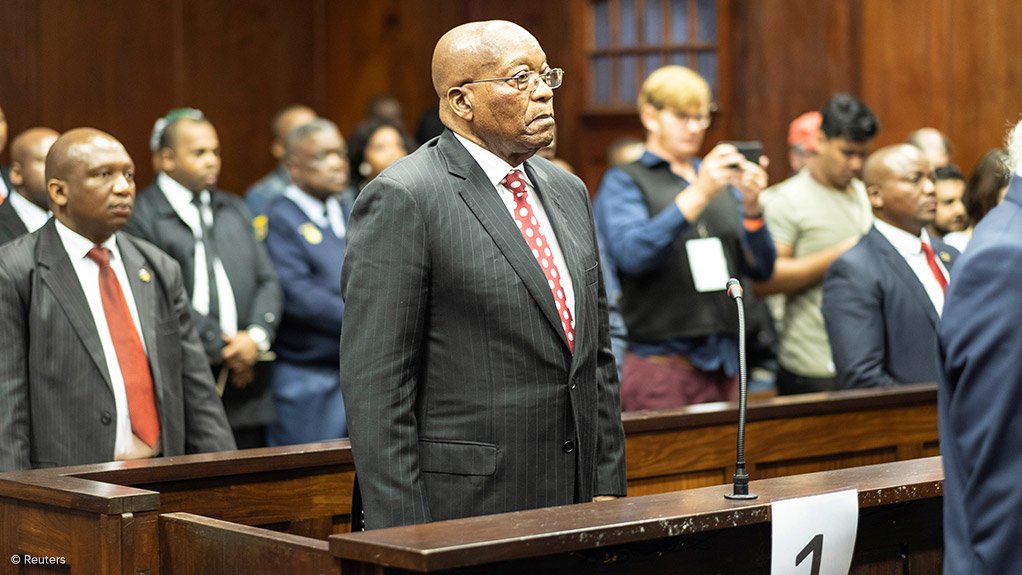The National Prosecuting Authority (NPA) on Thursday outlined in court how it believed former president Jacob Zuma had used extensive litigation, known as the Stalingrad defence, to delay being prosecuted on fraud and corruption charges.
Zuma had used a consistent pattern of litigation, designed ultimately to delay prosecution, said seasoned advocate Wim Trengove, acting for the state.
"The litigation endured for almost 14 years without interruption, barring one month. He lost all of those cases,” Trengove said.
He said the litigation was conducted at public expense and cost between R16-million and R32-million, calling it “luxurious litigation designed to delay”.
Trengove spoke before a full bench of the Pietermaritzburg high court, arguing against the stay of prosecution being sought by Zuma and French arms company Thales. Zuma and his defence team, as well as Thales' lawyers, were present in court.
Both are facing criminal charges relating to numerous alleged acts of fraud and corruption committed during the so-called ‘arms deal’ of the 1990s.
The defence teams for Zuma and Thales made their submissions on Monday and Tuesday respectively on why the case should be permanently dropped, citing, among other reasons, an unreasonable delay in prosecution, which they said was unconstitutional.
When Judge Thoba Poyo-Dlwati asked if Zuma had not been entitled to appeal court findings, as he had done, Trengove agreed that the former president was well within his rights to do so.
“But don’t then complain about the delay brought about by the disputes,” said Trengove.
Poyo-Dlwati and Trengove also agreed that Zuma’s disputes had mostly been successful in the lower courts, but those decisions were overturned once they reached the higher courts.
Nevertheless, the delays were of Zuma’s making, even if his decisions to dispute were made “in good faith and reasonably”, said Trengove, outlining the many delays in the case for judges Poyo-Dlwati, Jerome Mnguni and Esther Steyn.
Although investigations into the arms deal started in the early 2000s, Zuma was first charged in June 2005 after the conviction of his former financial advisor Schabir Shaik on two counts of corruption and one of fraud.
Shaik was found guilty and subsequently sentenced for making “regular, corrupt payments” to Zuma between 1995 and 2002. Some of these were allegedly from Thales, to keep the company away from the ongoing probe into the arms deal and to look favourably on the firm in any future contracts.
The NPA had the opportunity to prosecute Zuma alongside Shaik in 2004 but declined to do so, even though it said it had a prima facie case against Zuma.
The NPA head at the time, Bulelani Ngcuka, said he did not believe there was a reasonable prospect of winning the case, despite one of the lead prosecutors, advocate Billy Downer, believing otherwise.
Downer will be prosecuting at the trial - set down for later this year - should the judgment after this week’s submissions be in favour of the state.
A decision was again taken to prosecute Zuma in 2005 and in 2007, under different NPA heads, but withdrawn again in 2009 due to submissions made by Zuma about so-called “spy tapes” -- recordings of conversations between Ngcuka and Leonard McCarthy, the former boss of the now-defunct Scorpions which investigated and prosecuted organised crime and corruption.
The conversations, held after Ngcuka had resigned, were about the timing of charging Zuma. This was alleged to amount to political interference as Zuma was at the time contesting former president Thabo Mbeki for the leadership of the ruling African National Congress and ultimately that of the country.
On Thursday Trengove said there was no evidence of political interference and that conspiracy theories without it were not sufficient motive to stay a prosecution.
He said when seeking a stay of prosecution, a balance had to be struck between the rights of those accused, the public and a determination had to be made if the stay was in the interests of justice. The motives for prosecution were, he said, irrelevant.
“There is great public interest in seeing this case prosecuted,” said Trengove. It was important, he said, that Zuma was seen as being treated equally in the eyes of the law, despite his high public profile.
The NPA’s submissions were expected to continue until the afternoon when Thales’ application would be dealt with in more detail.
EMAIL THIS ARTICLE SAVE THIS ARTICLE
To subscribe email subscriptions@creamermedia.co.za or click here
To advertise email advertising@creamermedia.co.za or click here











